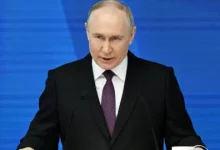The pound has continued to fall on currency markets as the government insists that the UK is prepared to leave the European Union (EU) without a deal.
Sterling hit a fresh two-year low of $1.2120 against the dollar on Tuesday, before recovering some ground.
The currency also slid against the euro, falling to €1.0881 at one point.
The fall in the value of the pound means UK tourists heading abroad could face a “horrendous summer”, according to one currency expert.
Under new Prime Minister Boris Johnson, the government has toughened its stance on a no-deal Brexit, which it has said is “now a very real prospect”.
The pound – which was trading at about $1.50 against the dollar before the EU referendum in June 2016 – has dropped by 2.4 per cent since Monday, when a spokeswoman for Downing Street said that the UK would not enter talks with Europe unless the so-called Irish backstop is scrapped.
She said that because the EU has said it is not willing to renegotiate on this point, “we must assume there will be a no-deal Brexit on“1 October 31.”
It follows comments at the weekend by Michael Gove, who wrote in the Sunday Times that the government was now “working on the assumption” of a no-deal Brexit, Mr Johnson appeared to strike a slightly softer tone on Monday afternoon, when he said he would “hold out the hand” and “go the extra thousand miles” to strike a new Brexit deal.
However, it was not enough to stop the slide in sterling.
Seema Shah, senior global investment strategist at Principal Global Investors, said: “If it looks like this juggernaut cannot be stopped, we do expect sterling to keep falling.”
She said that the pound could drop as low as $1.18 against the dollar, but added: “There is a widespread view that a no-deal Brexit will be stopped.”
The former chairman of Goldman Sachs Asset Management, Lord Jim O’Neill, told the BBC’s World at One programme that in addition to the risks of a no-deal Brexit, the markets were also “looking at a government that might be leaning on an independent central bank, possibly including the choice of its new governor” and the policy plans that suggest the government is going to increase spending. –BBC






